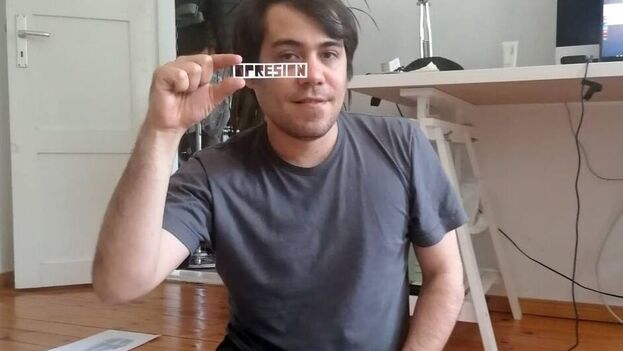
![]() 14ymedio, Havana, 14 November 2022 — The Cuban artist Hamlet Lavastida has been awarded the Freedom of Expression in the Arts prize, presented by international organisation Index on Censorship. The award recognises the creator’s work in documenting human rights abuses on the Island.
14ymedio, Havana, 14 November 2022 — The Cuban artist Hamlet Lavastida has been awarded the Freedom of Expression in the Arts prize, presented by international organisation Index on Censorship. The award recognises the creator’s work in documenting human rights abuses on the Island.
“Our winner in the Arts category is Hamlet Lavastida, who is pleased to accept the prize on behalf of all artists and activists in Cuba who are fighting for their freedom of expression and who help to create awareness of the reality of the situation faced by the Cuban people”, said the organisation on their Instagram account.
The jury chose Lavastida from nominees which included Thiyazen Alalawi from Yemen and Moe Moussa from Gaza. The Cuban won the recognition in the twenty-second edition of the prize because “he pushes the limits of censorship in Cuba and embodies the distinctive Cuban spirit of cultural resistance”.
“Throughout his career, Lavastida has used his art to fight for transparency and freedom of expression against the Cuban government. He sees his work as a tool of non-violence with which to fight against the current regime”, added Index on Censorship, which monitors threats against freedom of expression across the world.
It’s not the first time a Cuban has won the prize. In 2018, the artists Luis Manuel Ortero Alcántara and Yanelis Núñez also received the Freedom of Expression in the Arts prize for their work in the Museum of Dissidence.
Lavastida returned to Cuba from Germany in June 2021 after a residency at the Künstlerhaus Bethanien gallery in Berlin. After finishing his standard Covid isolation period he was detained by State Security and taken to Villa Marista prison under a “process of investigation” of the supposed offence of “instigation to commit crime”.
The artist, then 38, was declared a prisoner of conscience by Amnesty International. He had been investigated over a private chat conversation he had had, with other artists of the 27N protest group, on the Telegram app, in which he proposed the marking of banknotes with the logos of the San Isidro Movement and of 27N — an initiative which never came to fruition.
The Cuban government considered that Lavastida, well known for his critical works, “has been inciting and calling for actions of civil disobedience in the public sphere, using social media and direct influence over others”, according to a post on official website Razones de Cuba [Cuba’s Reasons] at the time.
The organisations Human Rights Watch, PEN America and PEN International condemned his arrest and demanded his unconditional release, along with that of tens of other artists and activists both on and outside of the Island.
Translated by Ricardo Recluso
____________
COLLABORATE WITH OUR WORK: The 14ymedio team is committed to practicing serious journalism that reflects Cuba’s reality in all its depth. Thank you for joining us on this long journey. We invite you to continue supporting us by becoming a member of 14ymedio now. Together we can continue transforming journalism in Cuba.
